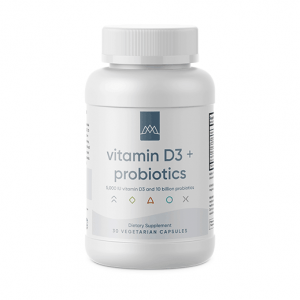Maximized Living Vitamin D
Maximized Living Vitamin D
Why Don't We Get Enough Vitamin D?
- Health Consequences of Not Getting Enough Vitamin D
- Am I At Risk For Vitamin D Deficiency?
- Vitamin D Nutraceuticals
- 3 Ways To Get More Vitamin D
Sometimes called "the sunshine vitamin," your skin can make vitamin D with regular sunlight. That makes the name a little misleading because your body can't manufacturer vitamins . Vitamin D is actually a hormone since your body can make it.
Yet most of us don't make enough from sunshine or get enough from dietary sources, contributing to low vitamin D (insufficiencies) or very low vitamin D (deficiencies).
Researchers find a significant increase in insufficiencies over the last three decades. Today, over 77 percent of Americans today are insufficient in vitamin D . Worldwide, one billion people — that's half the population — are deficient in vitamin D.
Why Don't We Get Enough Vitamin D?
 Inadequate sun exposure is a major cause. Numerous factors determine how much vitamin D you make from sunlight, including:
Inadequate sun exposure is a major cause. Numerous factors determine how much vitamin D you make from sunlight, including:
- Time of day: During mid-day, you make more vitamin D.
- Where you live: People in Hawaii will make more vitamin D than those in Seattle.
- Your skin color: Lighter-skin people make more vitamin D than darker-skin people.
- Your age: As you get older, you synthesize less vitamin D from sunlight.
Theoretically, about 80 percent of vitamin D supply should come from UV-B induced skin production. However, these and other factors limit how much many of us make.
The remaining 20 percent comes from food and nutraceuticals. Unfortunately, very few foods provide enough vitamin D.
Cold-water fish including salmon are among the best sources , but most of us aren't eating enough. In fact, you would have to eat two or more large servings of fatty fish daily to meet your vitamin D requirements . Mushrooms are one of the few plant foods that contain a little vitamin D.
One solution is to fortify foods and beverages like milk with vitamin D. However, many of these have low amounts of ergocalciferol (vitamin D2), which your body poorly absorbs compared with cholecalciferol (vitamin D3).
Inadequate sunlight coupled with eating too few vitamin D-rich foods and consuming poor-quality fortified foods ultimately can create insufficiencies or deficiencies, which can create widespread health issues.
MaxLiving Vitamin D3 + Probiotics 
Add essential nutrients into your diet with this whole food formula that features 5,000 IU of vitamin D3, 10 billion CFU of probiotics, and FOS prebiotics from chicory root.* Vitamin D3 is critical for healthy bones, joints, skin, and teeth, but it is not easily found in food sources. Probiotics support a healthy digestive tract and FOS, a powerful prebiotic, nourishes gut bacteria to ensure that the probiotics work optimally.*
- Supports healthy bones and teeth†
- Promotes healthy skin†
- Improves digestion†
- Supports immune system, brain, and nervous system health†
Health Consequences of Not Getting Enough Vitamin D
For such a small nutrient, vitamin D plays some significant roles throughout your body.
Immune health; strong bones and muscles; a healthy heart and lungs; kidney function; brain health; a stable mood; and even weight loss: Vitamin D contributes to all these things.
Vitamin D can also regulate insulin levels to help manage blood sugar levels and prevent diabetes. Its anti-inflammatory benefits can protect against autoimmune diseases and other diseases involving inflammation. Vitamin D even influence the expression of genes involved in cancer development .
That makes this tiny, but vital nutrient crucial for just about every condition imaginable. And it explains why inadequate amounts can be so detrimental. Vitamin D has been researched to provide therapeutic benefits for numerous conditions : autoimmune disease; cancer; cardiovascular disease; depression; infectious diseases; and osteoporosis. Deficiencies can even increase the risk of injury and recovery among young, healthy athletes.
Vitamin D even goes hand-in-hand with longevity. One review of 32 studies found that low levels could significantly increase your risk of early death.
Besides inadequate sunlight and too few vitamin D-rich foods, other conditions including smoking and pollution can increase your risk of deficiencies. So can conditions including diabetes, high blood pressure, and obesity.
Am I At Risk for Vitamin D Deficiency?
 Certain demographics with an increased risk for vitamin D deficiencies include:
Certain demographics with an increased risk for vitamin D deficiencies include:
- Breastfed infants
- Older adults
- People with limited sun exposure
- People with dark skin
- People with inflammatory bowel disease and other conditions causing fat malabsorption
- People who are obese or who have undergone gastric bypass surgery
Sufficient amounts of vitamin D, on the other hand, support immune health and reduce the chronic inflammation that contributes to numerous diseases.
The right amounts can help prevent and treat numerous conditions including type 1 and 2 diabetes, hypertension, glucose intolerance, and multiple sclerosis . Other research shows sufficient vitamin D can prevent respiratory tract infections, asthma flare-ups, and pregnancy complications .
The key phrase is the optimal amounts. Even when you're eating foods rich in vitamin D and getting sufficient sunlight, getting enough can sometimes be a challenge. While researchers find that average intake levels from foods alone were often insufficient , dietary nutraceuticals can substantially increase those amounts.
Vitamin D Nutraceuticals
Nutraceuticals make an easy way to meet your vitamin D requirements. The Recommended Dietary Allowances (RDAs) for vitamin D nutraceuticals is 600 IU or 15 micrograms (mcg) for nearly everyone aged one and over . That increases to 800 IU or 20 mcg once you hit 70 and older.
However, some researchers believe the RDAs for vitamin D are far too low. Dr. Cedric F. Garland, Dr.P.H., adjunct professor at the University of California (UC) San Diego's Department of Family Medicine and Public Health, argues this amount is only about one-tenth of what you need to reduce diseases related to vitamin D deficiencies.
But overdosing with vitamin D can also be dangerous, and some critics argue some people may be taking too much . Before you supplement, talk with your healthcare practitioner and ask for a blood test . That's the only way to know your vitamin D levels.
The optimal levels for vitamin D ranges from 30 – 80 ng/ml . That's a wide number, so discuss the ideal range for your condition with your healthcare practitioner. Many use short-term high-dose vitamin D nutraceuticals to help you optimize levels, which oftentimes gets good results.
Never take those high doses on your own, especially without knowing your current blood levels of vitamin D. More is not better, and blood levels of vitamin D over 150 ng/ml can be toxic .
You'll want to discuss other nutraceuticals you're taking with your healthcare practitioner since many multivitamins contain some vitamin D . Other nutraceuticals such as bone-supporting formulas might also contain vitamin D.
Once your blood work reveals optimal levels of vitamin D, discuss with your healthcare practitioner the ideal amount to take daily to maintain that healthy range.
Learn more about MaxLiving Vitamin D3 + Probiotics here.
3 Ways to Get More Vitamin D
For such a tiny nutrient, vitamin D plays many roles throughout your body. Getting sufficient amounts becomes important to prevent disease and support vibrant health.
These three strategies can help you do that.
1: Eat More Whole, Unprocessed Foods Rich in Vitamin D 
Fatty fish and pasture-raised eggs are good food sources . You'll find these and other foods with good amounts of vitamin D in our Core and Advanced Plans.
2: Get Some Sunshine
Emphasis on some. Among Americans, ultraviolet (UV) radiation is a carcinogen responsible for most of the estimated 1.5 million skin cancers and the 8,000 deaths due to metastatic melanoma every year.
 To maintain healthy levels of vitamin D, you don't need much sunlight: About 10–30 minutes of sunlight during the day , several times every week, without sunscreen. You might need more if you have, say, darker skin, or less if you have sensitive skin.
To maintain healthy levels of vitamin D, you don't need much sunlight: About 10–30 minutes of sunlight during the day , several times every week, without sunscreen. You might need more if you have, say, darker skin, or less if you have sensitive skin.
On average, a person with fair skin can get about 20,000 IU of vitamin D spending about 20 minutes in the sun wearing a bathing suit.
3: Supplement Smartly
A quality nutraceutical, such as MaxLiving Vitamin D3 + Probiotics , that contains the superior form of cholecalciferol or D3 ( not ergocalciferol or 2) makes an easy, effective way to maintain optimal levels of vitamin D.
 Along with its many other benefits, newer research shows that vitamin D can also play a role in gut health. Deficiencies can contribute to gut imbalances , paving the way for other gut and overall health issues.
Along with its many other benefits, newer research shows that vitamin D can also play a role in gut health. Deficiencies can contribute to gut imbalances , paving the way for other gut and overall health issues.
You'll sometimes find vitamin D nutraceuticals combined with other nutrients such as probiotics and prebiotics. These healthy gut flora and the nutrients that feed the good gut flora further support a healthy gut.
Because the nutrient comes in such tiny doses, manufacturers submerge vitamin D nutraceuticals in a fat-soluble carrier. This provides nutraceuticals bulk and improves absorption. Avoid vitamin D nutraceuticals in soybean oil, since soy can be a reactive ingredient for some people.
The Vitamin D Council recommends a 5,000-IU supplement daily. They note this amount of vitamin D will help most people meet ideal blood levels : Above 30 ng/ml and even into an optimal 40 – 50 ng/ml range without getting toxic levels.
Of course, individual amounts will vary, including your age, weight, overall health, and specific conditions. Always discuss taking and modifying vitamin D nutraceuticals with your healthcare practitioner.
Finally, take a vitamin D supplement with your meal . Because it is a fat-soluble nutrient, taking a vitamin D supplement with food will help this nutrient absorb optimally.

Source: https://maxliving.com/healthy-articles/vitamin-d-sunshine-storage-and-nutrition/


Tidak ada komentar:
Tulis komentar